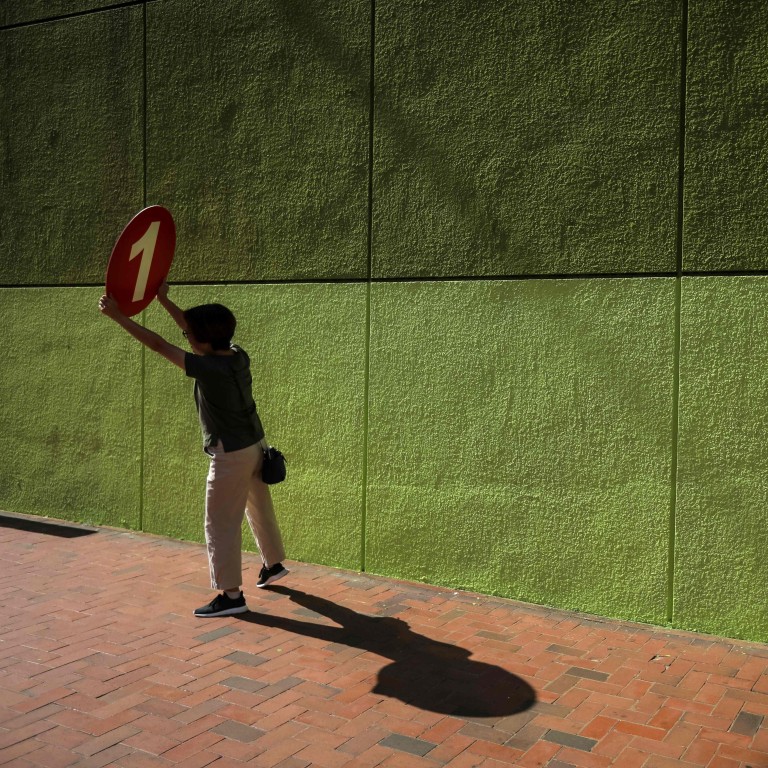
Hong Kong elections: crushed pro-establishment camp counts cost of defeat as it vows to review how it gauges public mood and its relationship with government
- Among its most pressing concerns is finding work for unseated councillors and their staff
- One core member says defeat was expected, blaming it on anti-government protests caused by deep-rooted tensions between Hong Kong and mainland China
Hong Kong’s pro-establishment camp was caught off guard by its landslide defeat in the district council elections on Sunday and says it now has to face challenges such as arranging alternative jobs, reviewing how it gauges the public mood and its relationship with the embattled government.
Anti-government anger that has been boiling over nearly six months of protests left its mark in polling stations across the city on Sunday, when voters turned out in their droves to back the pan-democrats over their pro-establishment rivals.
The pro-democracy camp seized 17 out of 18 district councils, taking at least 347 of the 452 seats. All councils were previously under pro-establishment control after its candidates dominated the 2015 elections.
“Our first headache is to take care of all the unseated councillors and their staff,” said a core member of the city’s largest pro-establishment party, the Democratic Alliance for the Betterment and Progress of Hong Kong, who asked to stay anonymous. The party suffered a humiliating loss, winning only 21 seats out of the 181 contested, down from 117 seats.

“It means around 90 district councillor offices will close. We have to get them back on their feet, especially those youngsters working full-time in the district,” he said. “We may have to refer them to jobs and it is not easy under this economy.”
District councillors are paid HK$33,950 (US$4,338) a month, with another HK$44,816 (US$5,726) operating expenses reimbursement. A councillor usually hires one or two assistants, he said, adding district offices were also important places for them to connect with residents.
He said those interested to serve in the district and aim for a re-run four years later could stay working as community officers, but the party could not pay them as much as they pocketed during their term in office.
Has pan-democrat domination made them kingmakers in race to succeed Carrie Lam?
Another core member said the party had expected defeat because of the anti-government protests, with its cause steeped in “the deep-rooted conflict between Hong Kong and the mainland”.
“Hongkongers’ mistrust of Beijing has evolved into opposition to the local government, police, and all pro-government parties and politicians,” he said. “But we didn’t expect it to be even worse than 2003 when we canvassed votes down on the ground.”
In the 2003 election, the party secured 62 of the 206 seats it contested.

“The problem is our barometer is not working – just like before the massive anti-extradition march broke out on June 9, we felt the public sentiment was OK,” the source said, adding ways to better take the public pulse, particularly among the middle-aged, would be one key issue the party had to review.
Speaking to the media on Monday morning, the party leader Starry Lee Wai-king and other six senior members bowed to apologise to their supporters for the drubbing, with Lee saying her offer to resign was rejected by the others.
Pan-democratic camp pledges to focus on residents’ needs
“Drastic changes have appeared in the city over the past five months, with violence and social unrest showing no signs of abating,” she said. “We understand that the public is discontent with the situation and worried about the future.”
She called on the embattled administration to deeply reflect on its work in restoring law and order, but sidestepped questions on their future relations and the government’s responsibility for their defeat.
Another party lawmaker said he understood the impression of them offering “blind support” to the government was lethal to their polling results.
“We had discussed supporting setting up a commission of inquiry. But knowing that the government would not do it, some of us thought we had the responsibility to safeguard its authority,” the lawmaker said. “But I believe we have to review the relationship with the government. Otherwise, we will be put under fire once in a while.”
But one party source dismissed the suggestion, saying there was no room for “bad boys” in the pro-establishment camp.
Decisive polls outcome demands ‘drastic response’ from Carrie Lam
Pointing to the defeat of Michael Tien Puk-sun, an outspoken figure in the camp, in the Discovery Park constituency of Tsuen Wan district, the source said there was no middle of the road in an increasingly polarised society.
However, Tien defended his stance, saying: “The middle of the road is my religious belief. If more in the camp had joined me in speaking out to the government, the city would not have turned out like this.”
He believed his stance attracted voters in the middle and that would surely benefit his odds in the Legislative Council election which uses proportional representation rather than single-member constituency in Sunday’s district council election.

